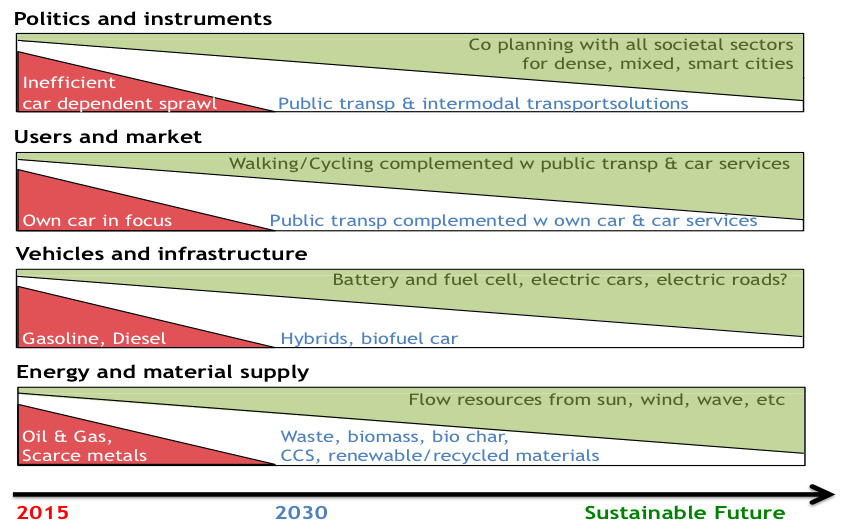About this report
This is the English short version of the report ‘Vägval 2030. Färdplan för snabbomställning till HÅLLBARA persontransporter’. The report is written by researchers from Blekinge Institute of Technology (BTH) based on a close cooperation with partners from the first phase of the GreenCharge project (2011-2015). See the report backside for a list of the project partners in Spring 2015.
The English report with a foreword by Peter Newman is available here.
You will find more information in Swedish at our website, including a video, a book summary and a full-size book.
Purpose and Research Questions
The transport sector’s dependence on fossil fuels is one of the biggest challenges in a shift towards a climate-neutral and sustainable society.
This roadmap report aims to investigate how electric vehicle systems can contribute to a faster transition to sustainable passenger transport in Southeast Sweden, as well as to present a methodology for guidance of similar work for faster transitions in other regions and sectors.
This work has been guided by a scientifically designed and proven Framework for Strategic Sustainable Development (FSSD). Specifically, answers are given to four research questions structured in relation to the four subsystems ‘Politics and instruments’, ‘Users and markets’, ‘Vehicles and infrastructure’ and ‘Energy and materials’:
- What could a sustainable vision for passenger transport in Southeast Sweden look like?
- What could be a milestone goal for 2030?
- What is the current reality in relation to the 2030 goal and the vision?
- How could the gap between the present, 2030 and the vision be bridged?
Results
The results of the report are summarised in figure 1 below.

Figure 1. The road to a fossil-free and sustainable personal transport system. How the four identified subsystems can be developed to phase out fossil fuels by 2030 and pave the way for a sustainable future.
Conclusions
The report shows that today’s focus on fossil independence and measures against climate change must be broadened to cover the whole sustainability challengeso that other sustainability issues are addressed and so that solutions to some of the sustainability issues do not create new ones.
The report also clarifies that it is necessary, practically possible and economically advantageous for Southeast Sweden to make a faster sustainability transition of passenger transportthan what has been proposed in previous studies and investigations. It is also likely that the same applies to the entire transport system and for the whole of Sweden and the world.
Even geopolitical benefits are likely. A global transition to transport and energy systems based on energy from widely available flow resources like sun and wind instead of the limited fossil fuels would likely reduce the conflicts risks in the world.Restricted cobalt, lithium and platinum resources that battery and fuel cell cars depend on, and other metals needed for solar cells and wind turbines can, however, give rise to similar conflict risks. This roadmap report’s recommendations on reduced transport needs and car dependency and its focus on resource efficiency counteract these conflict risks by striking against underlying resource-driving mechanisms. Should this roadmap be translated into practical policies, the forthcoming transition would therefore likely be made considerably more ‘future-proof’.
